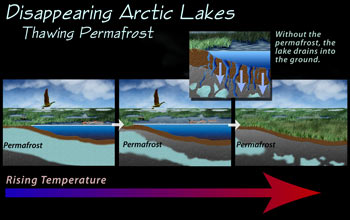|

Press Release 05-093
Arctic Warming May Be a Factor in Demise of Lakes

Loss of waterways also threatens wildlife
June 3, 2005
According to researchers, rising Arctic temperatures over the past two decades appear to have thawed the ground enough to allow more than 125 lakes to drain into the soil and vanish. The new finding provides additional evidence that the 20-year-old warming trend documented in the Arctic is physically affecting the landscape. Further, the scientists say, the abrupt draining has the potential to alter entire continental ecosystems as migratory birds and other wildlife depend on the waterways.
A team from the University of California at Los Angeles, the College of Environmental Science and Forestry at the State University of New York and the University of Alaska, Fairbanks, published the findings in the June 3 edition of the journal Science.
Laurence Smith, an associate professor at the University of California, Los Angeles, and primary author of the paper, said most of the affected lakes form atop permafrost, or permanently frozen ground. A solid permafrost prevents the lakes from draining, allowing hundreds of thousands of ponds, lakes and wetlands to dot the Arctic landscape.
He said the team's findings, which were funded by the National Science Foundation (NSF), indicate the current warming may be thawing the permafrost layer and causing lakes to initially grow and expand before seeping into the ground. As temperatures in the region continue to rise, Smith expects this trend to persist and spread northward, resulting in the disappearance of more lakes.
The lakes, Smith noted, are a dominant feature of the Arctic landscape. Their disappearance could have a devastating effect on the living conditions of native people and Arctic wildlife. Migratory birds depend on these lakes as a summertime habitat and they are critical to the feeding and rearing of young.
The researchers tracked changes in more than 10,000 large lakes by comparing satellite imagery from 1972, across 200,000 square miles of Siberian wilderness, with recent satellite data. Their study indicates the declines in total lake number have outpaced lake gains further north, where permafrost has warmed but is still intact.
-NSF-

Media Contacts
Dena Headlee, NSF 703-292-7739 dheadlee@nsf.gov
Program Contacts
Neil R. Swanberg, NSF (703) 292-8029 nswanber@nsf.gov
Principal Investigators
Laurence C. Smith, UCLA 310-825-3154 lsmith@geog.ucla.edu
Related Websites
UCLA Newsroom: http://www.newsroom.ucla.edu/

The National Science Foundation (NSF) is an independent federal agency that supports fundamental research and education across all fields of science and engineering. In fiscal year (FY) 2009, its budget is $9.5 billion, which includes $3.0 billion provided through the American Recovery and Reinvestment Act. NSF funds reach all 50 states through grants to over 1,900 universities and institutions. Each year, NSF receives about 44,400 competitive requests for funding, and makes over 11,500 new funding awards. NSF also awards over $400 million in professional and service contracts yearly.
 Get News Updates by Email Get News Updates by Email
Useful NSF Web Sites:
NSF Home Page: http://www.nsf.gov
NSF News: http://www.nsf.gov/news/
For the News Media: http://www.nsf.gov/news/newsroom.jsp
Science and Engineering Statistics: http://www.nsf.gov/statistics/
Awards Searches: http://www.nsf.gov/awardsearch/
| 


